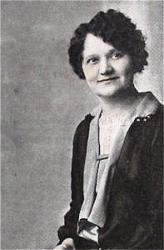Planning worship?
Check out our sister site, ZeteoSearch.org,
for 20+ additional resources related to your search.
- |
User Links
Search Results
He did not die in vain
Author: Anna B. Hoppe Appears in 1 hymnal Used With Tune: HE DID NOT DIE IN VAIN
He did not die in vain
HE DID NOT DIE IN VAIN
Appears in 3 hymnals Composer and/or Arranger: Grant Colfax Tullar Incipit: 31434 23117 12554 Used With Text: He did not die in vain
HE DID NOT DIE IN VAIN
He Did Not Die In Vain
Author: Anna Hoppe Hymnal: American Lutheran Hymnal #192 (1930) Meter: 6.6.8.6 Lyrics: 1 He did not die in vain,
My Savior and my Lord,
The Lamb of God, for sinners slain,
The blest incarnate Word.
2 Each drop of blood He spilt
Can healing balm bestow,
And sinners lose all stains of guilt
In that most holy flow.
3 What tho' the foe still rave?
He crushed the serpent's head.
We fear nor death, nor hell, nor grave
Since He rose from the dead.
4 In yonder mansions fair,
From sin and sorrow free,
We shall His heav'nly kingdom share
And all His glory see.
5 He did not die in vain;
While endless ages roll,
The fruit of all His grief and pain
Shall satisfy His soul. Topics: The Means of Grace The Redeemer Languages: English Tune Title: ABER
He Did Not Die In Vain
Grant Colfax Tullar

1869 - 1950 Composer of "HE DID NOT DIE IN VAIN" Grant Colfax Tullar was born August 5, 1869, in Bolton, Connecticut. He was named after the American President Ulysses S. Grant and Vice President Schuyler Colfax. After the American Civil War, his father was disabled and unable to work, having been wounded in the Battle of Antietam. Tullar's mother died when he was just two years old so Grant had no settled home life until he became an adult. Yet from a life of sorrow and hardship he went on to bring joy to millions of Americans with his songs and poetry.
As a child, he received virtually no education or religious training. He worked in a woolen mill and as a shoe clerk. The last Methodist camp meeting in Bolton was in 1847. Tullar became a Methodist at age 19 at a camp meeting near Waterbury in 1888.
He then attended the Hackettstown Academy in New Jersey. He became an ordained Methodist minister and pastored for a short time in Dover, Delaware. For 10 years he was the song leader for evangelist Major George A. Hilton. Even so, in 1893 he also helped found the well-known Tullar-Meredith Publishing Company in New York, which produced church and Sunday school music. Tullar composed many popular hymns and hymnals.
His works include: Sunday School Hymns No. 1 (Chicago, Illinois: Tullar Meredith Co., 1903) and The Bible School Hymnal (New York: Tullar Meredith Co., 1907). One of Grant Tullar's most quoted poems is "The Weaver":
My Life is but a weaving
Between my Lord and me;
I cannot choose the colors
He worketh steadily.
Oft times He weaveth sorrow
And I, in foolish pride,
Forget He sees the upper,
And I the under side.
Not til the loom is silent
And the shuttles cease to fly,
Shall God unroll the canvas
And explain the reason why.
The dark threads are as needful
In the Weaver's skillful hand,
As the threads of gold and silver
In the pattern He has planned.
He knows, He loves, He cares,
Nothing this truth can dim.
He gives His very best to those
Who chose to walk with Him.
Grant Tullar
--http://www.boltoncthistory.org/granttullar.html, from Bolton Community News, August 2006.
Grant Colfax Tullar
William Henry Monk

1823 - 1889 Person Name: W. H. Monk Composer of "ABER" in American Lutheran Hymnal William H. Monk (b. Brompton, London, England, 1823; d. London, 1889) is best known for his music editing of Hymns Ancient and Modern (1861, 1868; 1875, and 1889 editions). He also adapted music from plainsong and added accompaniments for Introits for Use Throughout the Year, a book issued with that famous hymnal. Beginning in his teenage years, Monk held a number of musical positions. He became choirmaster at King's College in London in 1847 and was organist and choirmaster at St. Matthias, Stoke Newington, from 1852 to 1889, where he was influenced by the Oxford Movement. At St. Matthias, Monk also began daily choral services with the choir leading the congregation in music chosen according to the church year, including psalms chanted to plainsong. He composed over fifty hymn tunes and edited The Scottish Hymnal (1872 edition) and Wordsworth's Hymns for the Holy Year (1862) as well as the periodical Parish Choir (1840-1851).
Bert Polman
William Henry Monk
Anna Hoppe

1889 - 1941 Person Name: Anna Hoppe Author of "He Did Not Die In Vain" in American Lutheran Hymnal Anna Hoppe was born on May 7, 1889 in Milwaukee, Wisconsin. She left school after the eighth grade and worked as a stenographer. She began writing patriotic verses when she was very young and by the age of 25 she was writing spiritual poetry. After some of her poems appeared in the Northwestern Lutheran, a periodical of the Wisconsin Evangelical Lutheran Synod, they came to the attention of Dr. Adolf Hult of Augustana Seminary, Rock Island, Illinois. He influenced her to write her Songs for the Church Year (1928). Several hymnals include her work, which was usually set to traditional chorale melodies, although she also made a number of translations. She died on August 2, 1941 in Milwaukee, Wisconsin.
NN, from Cyber Hymnal
Anna Hoppe


 My Starred Hymns
My Starred Hymns

